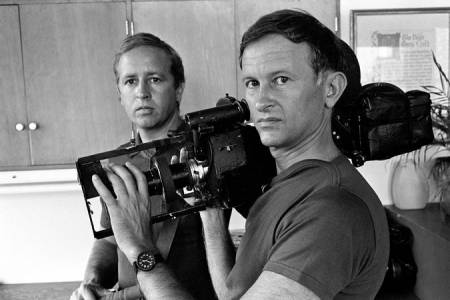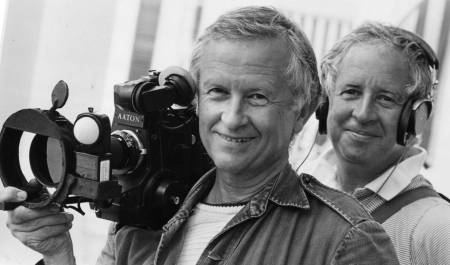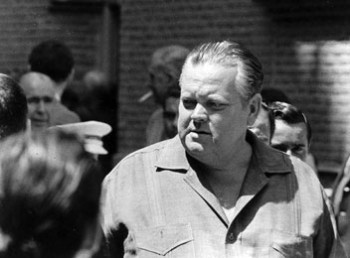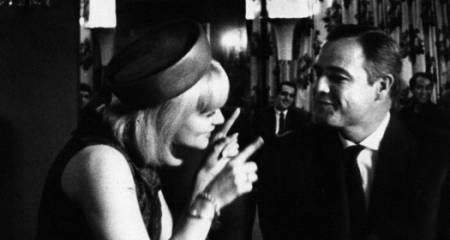[The festival press release.] The historic Vogue Theater in San Francisco in association with David L. Brown Productions and Maysles Films present the Albert Maysles Memorial Film Festival at the Vogue Theater, 3290 Sacramento St. in San Francisco, May 8-14. Screening 16 documentaries (shot and directed by Albert Maysles, many with his brother, David – the Maysles Brothers), the Festival honors the legendary documentary filmmaking pioneer who passed away from cancer on March 5th at age 88, with a first-of-its-kind documentary retrospective. Tickets are available at the Vogue Theater box office and at
http://www.cinemasf.com/vogue. Tickets are $12.50, $10 for students and seniors.
The Festival opens on Friday, May 8th with the Direct Cinema classic,
Salesman, along with Meet Marlon Brando. The program on Saturday, May 9 th will feature
Gimme Shelter, the 1969 Rolling Stones tour that ended tragically at the Stones’ free concert at Altamont, and
Running Fence, on the planning and creation of grand-scale-artist Christo’s epic 26-mile white nylon fence in Sonoma County. The Festival features four other documentaries on Christo’s epic-scale art pieces, the Academy Award-nominated
Christo’s Valley Curtain , The Gates (the 20-years-in-the-making project in Central Park), screening Sunday, May 10th, and
Islands and Umbrellas, screening Tuesday, May 12 th.
D. A. Pennebaker, Maysles’ fellow Direct Cinema pioneer at Drew Associates, (
Primary, Dont Look Back) will participate in a conversational remembrance of Maysles via Skype on opening night, May 8th at 6:15 p.m. Pennebaker will discuss collaborating with Maysles over 54 years including shooting a recent documentary that is currently in post-production. The Saturday May 9th screenings of
Gimme Shelter and
Running Fence will include Questions and Answers with distinguished guest filmmakers who worked with Mr. Maysles: Stephen Lighthill (cinematographer on both
Gimme Shelter and
Running Fence) and Joan Churchill (cinematographer on
Gimme Shelter). The Sunday, May 10th screening of
The Gates will include Q and A with Jon Else, acclaimed Bay Area cinematographer and Academy Award nominee (for The Day After Trinity). Long-time co-director with Maysles, Susan Froemke, will also participate via Skype on Wednesday, May 13th. With Maysles, she co-directed
Grey Gardens and the Oscar-nominated
Lalee’s Kin, along with ten other Maysles Films.
A special addition to the Festival is
Get Yer Ya-Yas Out!, the seldom-seen Maysles documentary on the 1969 Rolling Stones performance at Madison Square Garden. The rousing half-hour film will screen on Saturday, May 9th and Thursday, May 14th. The Festival will include multiple video messages or Skype Q and A from filmmakers who worked with Albert Maysles (and his brother), including Bill Jersey (cinematographer on
Showman, who gave Maysles his first industrial job as cinematographer). Additional invited guest filmmakers include: Maysles’ son, Philip; cinematographer on
Gimme Shelter, George Lucas; and Mayles protégé and two-time Oscar winner, Barbara Kopple.
David L. Brown. The Festival was conceived, produced and curated by Brisbane documentary filmmaker, David L. Brown, who met Maysles in 2007. Brown filmed a two-hour interview with him for a Les Blank film on Direct Cinema pioneer, Richard Leacock, another early close collaborator and long-time friend of Maysles at Drew Associates, the birthplace of Direct Cinema. Brown wrote an article on Albert Maysles, the Maysles Brothers and their films for
CineSource Magazine that Maysles described as "the best ever written about me." (available on request) The co-curator of the Festival is Adam Bergeron, programmer-operator of the Vogue Theater and owner-programmer of the Balboa Theater in San Francisco. I'll provide some previews and comments here.
Brown is a three-time Emmy Award-winning documentary filmmaker who has produced, written and directed over 80 productions and 14 broadcast documentaries on a variety of issues and topics. His documentaries have received over 85 international awards and have been broadcast on PBS and in sixteen countries.
Surfing for Life, his documentary on older surfers as models for healthy aging, was described by Bruce Jenkins of the San Francisco Chronicle, as "a treasure, perhaps the most intelligent treatment of surfing ever captured on film." His documentary on the long, troubled history of the new east span of the San Francisco-Oakland Bay Bridge,
The Bridge So Far: A Suspense Story, won two Northern California Emmys including Best Documentary. Brown has produced three film festivals on nuclear, environmental, peace and justice issues. He teaches Documentary Filmmaking at City College of San Francisco where, for 16 years, he has curated a documentary film series.






 Reply With Quote
Reply With Quote





Bookmarks